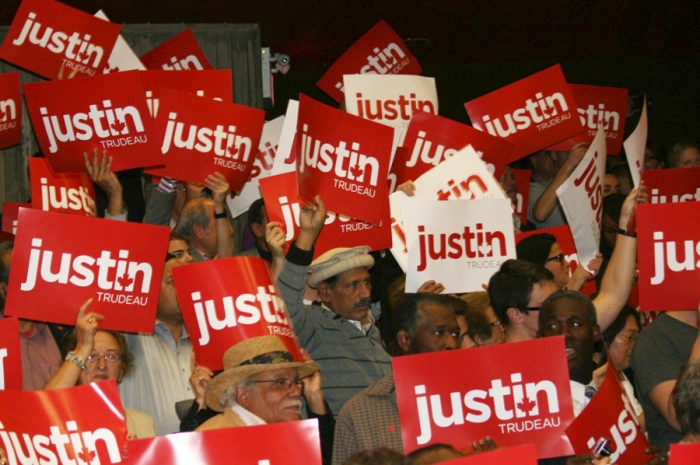Oh, the impermanence of young love. Not long ago, Canada’s youth naively fawned over Justin Trudeau. But, as flings meet their bitter ends, so too do they begin anew. Canadians have moved on to a new flame—newly-elected, uber-chic New Democratic Party (NDP) leader Jagmeet Singh. Compared to Trudeau, his suits are sharper, his hair longer and more luscious, and—most importantly—he hasn’t had the chance to disappoint Canadians yet.
The first sparks flew when Singh's compassionate handling of a heckler at a campaign rally in Brampton, Ontario received international attention. The incident came at the perfect time, just weeks before the NDP leadership vote on Oct. 1. Furthermore, Singh is the first non-white leader of a major Canadian political party. However, the celebration of this ‘first’—although a step forward—made little distinction between the positivity of the event and Singh himself. In aggregate, the starry-eyed coverage that followed no doubt contributed to his landslide victory.
But, all young relationships have potentially ugly sides. Singh’s swift rise and the accompanying fanfare prove yet again that support is increasingly won by personality, more so than policy. This imbalance corrodes democracy. Image-focused campaigns benefit party leaders at the expense of every other political actor—including the voter. Image campaigns like Trudeau’s and Singh’s have had particular success with young people, who are the most plugged-in to social media and its ability to amplify public personas. The trend towards image campaigning and corresponding personality politics shows no sign of slowing down as millennials born between 1981 and 2000 become the largest segment of the electorate. If young people don’t demand to be campaigned to in a more substantial, policy-focused way, we risk lowering the quality of our political discourse.
While personal image has always been important in political campaigns, Trudeau took it to new heights in the 2015 election. The guiding principle? Sunny ways—a blend of forward-looking optimism and ambitious reforms to tackle social injustice. This brand paid off, well, handsomely. For months, newly-elected Trudeau bathed in fawning coverage that focused more on his sex appeal than his politics. Canadian political scientist Donald J. Savoie presciently observes this effect in his 2010 book, Power: Where is it?.
“Increasingly, the objective of all parties at election time is to sell their leaders to the media, rather than their ideas, policies, or party,” Savoie writes.
This is as true of Singh as it is of Trudeau. Both source their popularity, especially with youth, from personal appeal and mastery of media moments, be they Singh’s appeals for “love and courage” in Brampton, or Trudeau’s feats of athleticism. These aren’t your parents’ politicians—they look more like the cute guy at the gym or the debate union champ than the slack-suited legislators of yore. While media moments are an old concept, they’ve redoubled in importance with the rise of social media. Short, context-free clips are shared repeatedly.
Still, society cannot blame the media entirely for softball coverage of politicians. Outlets produce content they think consumers want to read; therefore, when the media treats politicians like celebrities, citizens ask for fluff. This creates a cycle in which Canadians sell themselves short of the issues-driven coverage they deserve.
Personality politics also have consequences within parties. When elections are won and lost on leaders’ images, party caucuses are hard-pressed to cross their chiefs. Most voters see the exercise as picking a prime minister rather than a favourite local candidate. Consequently, local MPs depend on their party leader for their own re-election. For any given Member of Parliament, publically criticizing their leader is a lose-lose situation: Either their criticisms fail to move the public and anger their boss, or they succeed in moving public opinion against their party leader—which, given how voters make decisions, threatens the MP’s own job security. In times of majority government, this means that there are virtually no parliamentary checks on the prime minister’s power.
Just like the bad boy your mother warned you about, engaging in personality politics is tempting. We would all like to be led by someone we identify with, or that we’d simply like to share a drink with. But, if citizens base their votes on these feelings, they incentivize politicians and media coverage to focus on image over policy. This moves political discussions away from solutions and toward distractions. Given the younger generation’s pitiful voter-turnout rates, some might consider any political engagement a cause for celebration. But, Canadians must think critically about the way they engage with politics. Making politicians into celebrities gives them inappropriate influence in government and puts our democratic health at risk.








